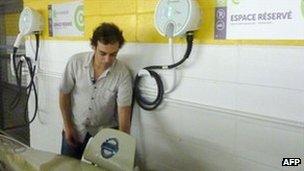European electric car charging standards agreed
- Published

More people will buy electric cars if there is a uniform charging system, the industry says
The European motor industry has agreed on a common system for charging any electric car across Europe.
The ACEA, the automobile manufacturers' trade association, wants one type of plug to become standard for all electric cars.
"This... paves the way for a harmonised solution around the globe", said ACEA's secretary general, Ivan Hodac.
The association wants regulators, infrastructure bodies and rivals across the world to adopt the same standard.
"We call on the European Commission, the standardisation bodies and the infrastructure providers to adopt these recommendations and to clear remaining issues as soon as possible," Mr Hodac said.
Currently, several types of charging methods are used.
This has resulted in the "fragmentation of the market across Europe and abroad", according to Mr Hodac.
Comprehensive proposal
The main agreement announced by ACEA relates to a standardised plug.
But the industry has also come up with a series of detailed recommendations covering the whole link between the public charging infrastructure and the car's electricity inlet.
The recommendations suggest how the car should communicate with the grid, and how the power companies should charge for the electricity used.
The proposal is broad, addressing both slow and fast charging systems with either direct or alternating current.
Slow growth
Agreeing pan-European standards and implementing them by 2017 would be "a major step towards the broader introduction of electrically-chargeable vehicles in Europe", he said.
"Standardisation provides predictability to investors; it enables economy of scale and reduces costs.
"We have also ensured a solution that meets the highest safety standards and is easy to use."
All these factors should make it less confusing for consumers who are currently faced with a muddled picture to take the leap and buy electric cars.
Most carmakers are working hard to develop electric motoring systems for the future, with some even offering electric cars today.
However, electric motoring is likely to remain in the minority compared with cars powered by petrol or diesel engines.
"Most stakeholders assume a realistic market share for electrically chargeable vehicles in the range of 3% to 10% of new sales by 2020 to 2025," the ACEA predicted.